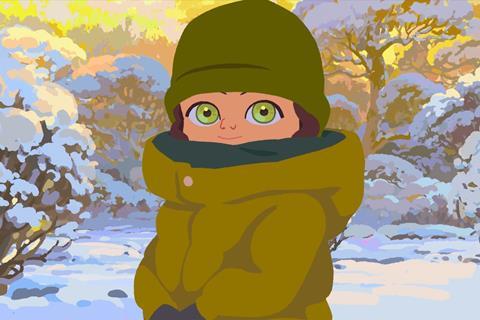Charming animation is based on Amelie Nothomb’s memoir ‘The Character of Rain’

Dirs/scr: Mailys Vallade, Liane-Cho Han. France. 2025. 76mins
The awakening consciousness of a little Belgian girl born in Japan is recounted to charming and sometimes profound effect in debut directors Mailys Vallade and Liane-Cho Han’s 2D animation Little Amelie. Based on Amelie Nothomb’s 2000 memoir ‘The Character of Rain’, from which it derives its oblique, arresting perspective and lightness of touch, Little Amelie is, despite occasional inevitable lapses into sentimentality, visually engrossing and thought-provoking fare that ranges daringly across emotions ranging from pure delight to fear and horror. Its playful seriousness should have a cross-generational appeal following its premiere as a Cannes Special Screening.
Visually engrossing and thought-provoking fare
The film is set, like Nothomb’s short novel, in the late 1960s. Thanks to a Japanese belief that, until the age of three, children are closer to the divine than the human, from the moment she is born Amelie (Loise Charpentier) believes she is a god, able to comment sharply on the lives of herself and her family – actress mother Daniele (Laetitia Coryn), diplomat father Patrick (Marc Arnaud), sister Juliette (Haylee Issembourg), and unpleasant older brother Andre (Isaac Schoumsky) – to often disarming effect. To the outside world, though, Amelie is initially unresponsive, a mere mortal who can only swallow, digest and discharge.
In its engaging child’s-eye view of things, one of the film’s signature tactics is to roll up external events and psychology into one. And so, following an earthquake, Amelie emerges speaking perfect French into the terrible twos, but is calmed at a single stroke by her discovery of the Belgian chocolate brought by her grandmother Claude (Cathy Cerda). “I became joy,” Amelie triumphantly declares. Also key is the arrival of a nanny, Nishio-San (Victoria Grobois), who will become her friend and confidante in the defining relationship of her early life. Nishio-San will show Amelie, in one of many standout visual moments, how the pictogram of rain (’ame’ in Japanese) is hidden in that of her own name.
A toddler with an adult perspective on her own life inevitably generates plenty of moments of gentle, wry humour – a vacuum cleaner is called a “disappearing machine”, and Amelie complains about how her older brother spends all afternoon sitting on her. Later, Amelie’s reflections become darker and more philosophical, as when she starts to learn about loss and death after finding her father sobbing over the death of Claude. A further dark strand is the threatening presence of Kashima-San (Yumi Fujimori), the family’s black-clad, witch-like landlady, for whom Amelie will learn to feel compassion. And there is a dark side to Nishio-San’s history, too – her family was killed by the bombings of Kobe in 1941 – leading Amelie to ask her the great, unanswerable question “why do we die?”.
The always delicate, busy visuals come from an artistic team including director Remi Chaye (The Roof of the World), and both western and Japanese stylistic influences are visible in a film which is partly about whether Amelie truly belongs in Belgium or Japan. The airy, bright, pastel-dominated 2D images are a representation of Amelie’s vision of things, imaginatively combining elements which could come over as merely random or surreal if we didn’t know that we were seeing through a child’s eyes.
Sometimes the effect is magical, as when Amelie walks out alone through the family’s garden paradise early one morning – the power of the natural world is never far away, whether in the details or in the magnificent mountain ranges that loom in the background. One of the less self-consciously poetic sequences involves preparations for the Obon, the Japanese festival of the dead, followed by enthralling images of lanterns floating on water as memorials to the deceased. Despite all the darkness lying behind its bright colours, and the sentimentality of its final stretch, Little Amelie is ultimately an optimistic film which teaches us that memories can overcome the power of loss, and our humanity is our greatest gift.
Production Companies: Maybe Movies, Ikki Films, 2 Minutes, France 3 Cinema, Puffin Pictures, 22D Music
International Sales: Goodfellas Animation, feripret@goodfellas.film
Producers: Henri Magalon, Claire La Combe, Edwina Liard, Nidia Santiago
Screenplay: Liane-Cho Han, Aude Py, Mailys Vallade, Eddine Noel
Production Design: Eddine Noel
Editing: Ludovic Versace
Music: Mari Fukuhara
Main Cast: Loise Charpentier, Victoria Grobois, Yumi Fujimori, Cathy Cerda
























